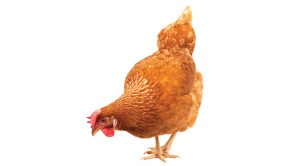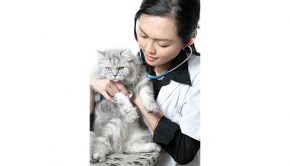VET CHECK
Treating the Whole Pet
by Julie Peterson
About 10 years ago, Kim Krouth’s dog, Buckeye, was suffering from severe allergy symptoms. The mixed-breed shepherd was licking and biting her paws until her toe pads were bleeding. “Our conventional vet prescribed steroids,” recalls Krouth. “It helped some, but also agitated Buckeye. When I found out that other side effects could include serious health problems, I didn’t want to put her at risk.”
The Madison, Wisconsin, animal lover headed to a holistic pet supply store to ask about alternative treatments for the dog’s allergies. She learned about herbal remedies, and was advised to take Buckeye to a holistic veterinarian. “Treating her holistically seemed like a better option than the side effects of treatment with drugs,” she says.
The holistic veterinarian recommended acupuncture. It helped, but the dog later became sensitive to the needles. At that point, she was given homeopathic plant-based treatments that worked well with no side effects. Buckeye, now 15, has also received laser light therapy and spinal manipulation to help with mobility in her senior years.
The Holistic Difference
Holistic veterinarians have been treating dogs, cats, chickens, livestock and exotic animals across the nation for some time, but many people aren’t entirely clear about how their approach—and their training— differs from a conventional vet. Both enter the profession after earning a doctor of veterinary medicine (DVM) degree. Holistic
Practitioners can then choose to train in a variety of modalities, including acupuncture, herbs and physical rehabilitation, plus trigger point, megavitamin and stem cell therapies.
“Any method that is sufficiently different from conventional medicine requires extra training … over a period of weeks, months or years,” says Nancy Scanlan, DVM, the executive director of the American Holistic Veterinary Medical Foundation, in Mount Shasta, California.
Veterinarians, holistic or not, typically do the same initial examination of an animal, she says. From there, a holistic vet may look at additional areas or assess things in a slightly different way. “For example, someone trained in veterinary osteopathy or veterinary chiropractic would explore the range of motion of joints or the spine.”
In treatment, holistic DVMs use an integrative approach. The goal is to look at the animal as a whole and treat the underlying condition, rather than treating the symptoms. “Integrative medicine is about broadening our medical options, blending both conventional medical and holistic approaches. It focuses on client education and participation in the healing process of their pet,” says Danielle Becton, DVM, of Aloha Pet & Bird Hospital, in Indian Harbour Beach, Florida.
Holistic veterinarians may also choose to use fewer conventional drugs and limited vaccinations. “Vaccine titers can be used to determine if a patient has adequate antibodies to a disease to create immunity,” says Becton. “If a pet is already immune, they may not need another vaccine booster that year.”
Becton and Scanlan agree that alternative treatments such as acupuncture, laser therapy or massage can be used in lieu of drugs for pain management. However, Scanlan does note that in an acute or emergency situation, many natural methods do not work fast enough, “and that is when holistic veterinarians are more likely to use drugs.”
Choosing a Holistic Veterinarian
Pet owners seek out holistic veterinarians for different reasons. In Krouth’s case, it was the unacceptable side effects to drugs that led her to explore other options. Becton points out that she gets clients looking for a more natural approach for their pets after they personally have had success with human integrative medicine.
However, it’s important that pets are treated by professionals that are trained to treat animals. People with holistic training for humans may not understand animal anatomy or physiology.
Ultimately, choosing a veterinarian is a personal decision, and seeing a beloved pet thrive is the best confirmation that it was the right one. “We are so glad that we still have Buckeye at this golden age, and believe it’s due to holistic care that she has lived a comfortable, long life,” says Krouth.
Julie Peterson lives in rural Wisconsin with her husband, dogs and chickens. She has contributed to Natural Awakenings for more than a decade. Contact her at JPtrsn22@att.net.












